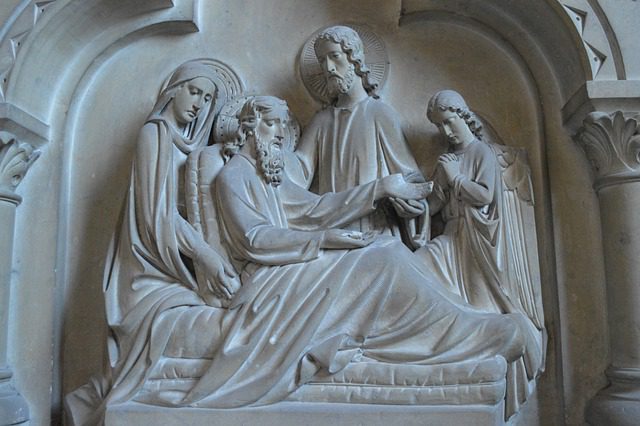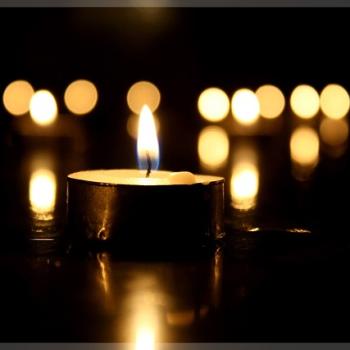
I was thinking about Rosie and Michael on Sunday, and that led me to thinking about Saint Joseph.
One evening, when Rosie was three and a half and being particularly noisy, Michael snapped at her. And then he immediately calmed down and said, “I do owe you an apology, Rose. I lost my temper and yelled at you. I’m sorry.”
Rosie instantly held out a small hand for a handshake. “Dat’s okay. No hard feelings.”
This memory popped into my head at Mass this Sunday, for some reason. I started thinking about it: the ordinary human grouchiness, the humble apology, the little one responding with perfect forgiveness and unconditional love. And I wondered if the Holy Family ever had that type of interaction. Saint Joseph was a just man, surely an admirable and virtuous man, but not without sin like Christ and Mary. Jesus was like us in all things but sin. Being a noisy, irritating child is not a sin, after all. It’s just a developmental phase. It could be that Saint Joseph lost his temper now and again. And then, because he was a just man, he realized his mistake and was sorry.
“I do owe you an apology, Yehoshua. I lost my temper and yelled at you. I’m sorry.”
“That’s okay. No hard feelings.”
I imagine Jesus says the same to us.
This is what I was daydreaming about, instead of listening to the homily, at Mass this Sunday, Father’s Day. I was thinking about Saint Joseph.
I was thinking about the just man who found out the very young woman he’d found himself engaged to in an arranged marriage was already pregnant. Not wanting to expose her to shame and possibly to a death sentence, he planned to call the whole thing off. But an angel appeared in a dream and explained things, and Joseph took her in. He took her to Bethlehem with him, and that’s where the baby was born.
I wonder how it felt for Saint Joseph to drop everything and rush the border, because he’d been ordered to in another dream. He knew what he had to do, but it must have been traumatic. Leaving, not knowing when he’d be back or what would happen while he was gone. A long journey in hiding, in danger every moment, carrying that baby who needed to be comforted and changed and fed whenever it was least convenient. Taking refuge in Egypt among the Jewish people who lived there, having to work to support the family with borrowed tools, trying to pick up the language as he went along. And then going back, because he’d been ordered to in a dream. From the place his people had once lived when they were enslaved to the place his people lived now, and were occupied. Finding out that the son of the one who wanted to murder Jesus was now in power, and settling somewhere else. This must have all worn him down. But he kept on working and trying to do the right thing for his family, because he was a just man.
I wonder if he thought about that flight into Egypt the rest of his life, every time a patrol of Roman soldiers wandered by, every time they harassed the people in Nazareth just because they could, every time they leered at Mary as she left for the well or the market, every time they barged into his shop and demanded they fix something for free. All the things that soldiers do.
I wonder if the memory terrified him, when he woke up in the night.
I wonder if he couldn’t stop thinking about it for those terrible nights when Christ was lost in the temple. It was his whole job to protect Mary and that strange child, and he’d lost him. He was gone without a trace in a city crawling with Roman soldiers, far from home. What would he do now?
I wonder what happened after that.
I have seen so many pictures of Saint Joseph lying quietly in bed, dying attended by a young adult Jesus and by Mary. That’s the tradition– that Saint Joseph was a much older man who passed away peacefully just before Christ began His public ministry. I wonder if it happened quickly, in the middle of a day’s work one sweltering afternoon, the way he probably wanted… or if death came that dreadful other way, slowly, inch by inch. Perhaps there came a time when the tools started to slip in his hands, and he was embarrassed, and feared for how he would provide. Perhaps he didn’t really notice he was getting absentminded, and was offended if it was pointed out. Maybe Jesus had to quietly follow him around the carpentry shop or the construction site, making sure he didn’t hurt himself.
Maybe there came a day when his mind went. Jesus went to work by Himself and Mary stayed home, keeping him out of trouble, patiently listening.
Perhaps he forgot exactly where he was, and went back to the most terrible time in his life, the time he couldn’t forget. Mary who was so much younger, pregnant and in danger of being stoned to death; the angel appearing in a dream and his taking her into his home. That ridiculous trip to Bethlehem for the census, that night in the back of the stable, the birth. The visits from the shepherds and those strange men from somewhere else. The other dream. The flight. The years in hiding. Coming back.
Perhaps he kept thinking of Jesus running around the carpentry shop as a little child, and panicking because he couldn’t find Him anymore. It was his whole job to protect Mary and that strange child, and he’d lost Him again. What now?
And perhaps Mary kept on saying, “Don’t worry, He’s coming home. He loves you and He’s coming home.”
Perhaps it got very bad toward the end. Maybe he needed to be changed and fed from a cup, and Mary was busy all day taking care of him like a baby. Maybe Jesus took over when He got home from work, so that she could go to the well or the market and get some fresh air and a minute to herself. Maybe He wished He could make this all go away by a miracle, but that wasn’t the plan He and His Father in Heaven had come up with. The plan was to be born of the Virgin with angels announcing the miracle, and then to preach and work miracles for a time as an adult, and to die the terrible death His beloved children demanded He die, to descend into Hell and rise again– and in the time between His birth and His public ministry, to live quietly in obscurity as an ordinary man, and to suffer what ordinary men suffer. Ordinary men suffer grief. Ordinary men suffer watching their parents get old, and not being able to intervene to help through miracles. Perhaps that was how it worked.
Maybe on the day it was finally over, Christ stayed home to comfort and change and cup feed His foster father, the just man who had saved Him from genocide. Maybe at the very last minute He, God Himself, forgave his father’s sins, and it sounded like “That’s okay, Dad. No hard feelings.” And He does the same for us.
And then Christ went out to begin His public ministry, and healed, and preached, and suffered and died. And after He died, He opened the gate to paradise and let His foster father in to be with the Father, and there he intercedes for us.
That was what I thought about in Mass on Father’s Day, when I should have been paying attention.
Image via Pixabay
Mary Pezzulo is the author of Meditations on the Way of the Cross and Stumbling into Grace: How We Meet God in Tiny Works of Mercy.
Steel Magnificat operates almost entirely on tips. To tip the author, visit our donate page.












